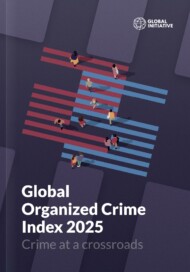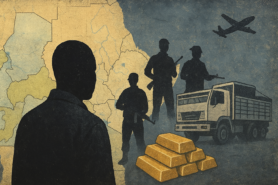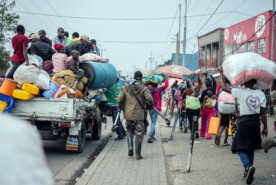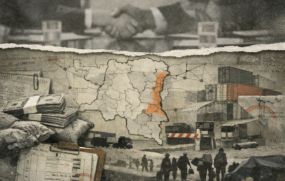Posted on 01 Jul 2025
The agreement signed on 27 June 2025 between the DRC and Rwanda represents an opportunity to make progress in resolving the M23 crisis in eastern DRC. However, the US administration’s success in sponsoring this agreement might prove short-lived, primarily because it does not prioritize the fight against organized crime. The benefits that all the national and international protagonists in the conflict derive from their involvement in illicit economies have over the years become the most structural factor of this conflict.
While armed rebel groups like the M23, and other militias, may not embody the essence of the archetypal criminal organization as we normally conceive of it, they are nevertheless sustained by illicit activities, like other organized criminal actors, using violence to control economic activities, the revenue from which has enabled them to set up a parallel administration. The conflict in the DRC has thus become structurally criminalized by all armed actors exploiting natural resources, and this is arguably a justifiable example of geocriminality, notably through the role played by Rwanda in this context.
When discussing the term ‘geocriminality’, understood as the instrumentalization of organized crime by a state, it is common to think of great powers. However, an increasing number of regimes are now using organized crime to further their economic and financial objectives. In Africa, Rwanda is a notorious example of this. Driven by a desire to prevent the conditions that led to the 1994 genocide of the Tutsis from recurring, the regime is pursuing an aggressive policy of repression at home and destabilization abroad. Although Rwanda’s security concerns are genuine, they have resulted in the weaponization of organized crime for economic and geopolitical purposes.
One characteristic of geocriminality is the use of proxies to destabilize neighbouring states, and Rwanda’s behaviour in the context of the M23 crisis is arguably a prime example. The armed rebel group operating in eastern DRC is, according to the UN Security Council, receiving support from the Rwandan Defence Forces (RDF). Although the Rwandan authorities deny any involvement, sources inside the regime privately justify their support for the M23 on the grounds of combatting the security threat posed by the Democratic Forces for the Liberation of Rwanda (FDLR). Hutu militias who massacred hundreds of thousands of Tutsis in the genocide fled to what is now the DRC and some formed the FDLR. President Kagame reportedly views the militia as an ‘existential threat’.
But this ethnic security motive seems to conceal a broader agenda. According to several sources in the region, the Rwandan forces advancing alongside the M23 are not only targeting areas where the FDLR operates, but also seemingly supporting the territorial capture of mineral and agricultural-rich regions. Indeed, despite heavy fighting, mining activity in areas occupied by the M23 has continued. Minerals such as gold and coltan are being shipped across the border to Rwanda by networks involving individuals with links to the army and the ruling party. But while some elites profit, communities pay the price. Authorities in the DRC estimate that the conflict has killed more than 7 000 people in January and February 2025 alone.
Another dimension of geocriminality is state-embedded actors colluding with criminals to silence critics abroad. Reports have described Rwanda’s activities as a transnational repression system, which has included disseminating false information to INTERPOL. A 2024 investigation revealed evidence of such repression in Belgium, home to one of the largest Rwandan diasporas. According to the investigation, over the last 10 years, the Rwandan authorities have monitored, intimidated or threatened Rwandans living in or visiting Belgium.
The Rwandan government took responsibility for financing a man who tricked Paul Rusesabagina, an opponent of the Kigali regime, into returning to Rwanda, where he was tried and convicted. Rusesabagina, who gained international notoriety for inspiring the film Hotel Rwanda, was told he was flying to Burundi in a private plane but was instead taken to Kigali against his will.
Several assassinations and assassination attempts have also been attributed to the Rwandan regime, although there is no evidence to suggest that these were carried out using the services of criminal organizations.
Rwanda’s involvement in geocriminality underscores the geographical diversity of this growing phenomenon and the challenges associated with addressing it. On the one hand, geocriminality negatively impacts communities, regional security and the personal safety of regime opponents. On the other hand, Rwanda remains popular with the donor community, who see it as a key regional actor. Rwanda’s supporters want to maintain stability and commend the significant contributions of the Rwandan army in peacekeeping and other security operations, such as the one in Cabo Delgado, Mozambique. They also point to Rwanda’s willingness to participate in major global initiatives, such as combating climate change.
However, Rwanda’s allies must recognize the serious risks associated with geocriminality, such as the legitimization of criminal practices and the exacerbation of instability through proxy actors. Rwanda’s allies must condemn this practice and curb the instrumentalization of organized crime at home and abroad. If a diplomatic approach proves insufficient, states should consider using international instruments, such as the Arms Trade Treaty to review their policies on exporting military equipment to Rwanda, or sanctions to target the structures and individuals who mastermind criminal acts. Recent decisions by the US and the EU to sanction James Kabarebe, Rwanda’s Minister of State for Regional Integration, and Francis Kamanzi, the head of the Rwandan mining authority, are a step in the right direction. Sanctions should also be extended to other enablers, such as those who receive products from the illegal economy in the DRC.
Acknowledging Rwanda’s legitimacy to ensure its territory’s security should not blind the international community to the regime’s involvement in geocriminality. It is imperative that the regime’s actions and policies remain in compliance with international law. And long-term peace or development gains will be difficult to achieve without understanding and taking into account the criminalized nature of the conflict.



